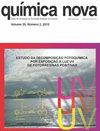PLANEJAMENTO DE FÁRMACOS CONTRA COVID-19: UMA EXPERIÊNCIA DE ENSINO REMOTO DE QUÍMICA FARMACÊUTICA
IF 0.5
4区 化学
Q4 CHEMISTRY, MULTIDISCIPLINARY
引用次数: 0
Abstract
DRUG DESIGN AGAINST COVID-19: A REMOTE TEACHING EXPERIENCE IN PHARMACEUTICAL CHEMISTRY. Infront of with the difficulties faced in making a new drug available to the population, it is essential to seek ways to simplify the process. In silico methodologies are alternatives to benchtop experiments, being frequently used due to their speed and low cost. The present study aimed to formulate a theoretical-practical activity in the Pharmaceutical Chemistry course, where students applied their knowledge of structural modeling and molecular docking to propose bioactive compounds against molecular targets of the SARS-CoV-2 virus. The class was divided, and each group presented a drug candidate, the precursors being natural molecules. In total, seven derivatives were designed and tested against different macromolecules, and then an in silico prediction of their physicochemical characteristics was performed. The docking results were positive for all derivatives, in terms of binding energy, mainly GEND with –9.0 kcal mol-1. In addition, the prototypes exhibited good interactions with the amino acids of the respective targets, mainly KAED, QUED and GEND, in addition to presenting adequate physicochemical properties for meeting the Lipinski restrictions. Therefore, this study presented at least three potential inhibitors of SARS-CoV-2, showing the importance of using computational tools in drug design and development, as well as in teaching practice.COVID-19药物规划:药物化学远程教学经验
针对covid-19的药物设计:药物化学远程教学经验考虑到向公众提供一种新药所面临的困难,必须设法简化这一过程。计算机方法是台式实验的替代品,由于其速度快和成本低而经常使用。本研究的目的是在药物化学课程中形成一种理论-实践的活动,学生运用所学的结构建模和分子对接知识,提出针对SARS-CoV-2病毒分子靶点的生物活性化合物。班级被划分,每组提出一种候选药物,前体是天然分子。总共设计了7种衍生物,并对不同的大分子进行了测试,然后对它们的物理化学特性进行了计算机预测。所有衍生物的对接结果均为正,结合能以GEND为主,为-9.0 kcal mol-1。此外,该原型除了具有满足Lipinski限制的足够理化性质外,还与各自靶标(主要是KAED、QUED和GEND)的氨基酸表现出良好的相互作用。因此,本研究提出了至少三种潜在的SARS-CoV-2抑制剂,显示了在药物设计和开发以及教学实践中使用计算工具的重要性。
本文章由计算机程序翻译,如有差异,请以英文原文为准。
求助全文
约1分钟内获得全文
求助全文
来源期刊

Quimica Nova
化学-化学综合
CiteScore
1.60
自引率
12.50%
发文量
72
审稿时长
2-4 weeks
期刊介绍:
Química Nova publishes in portuguese, spanish and english, original research articles, revisions, technical notes and articles about education in chemistry. All the manuscripts submitted to QN are evaluated by, at least, two reviewers (from Brazil and abroad) of recognized expertise in the field of chemistry involved in the manuscript. The Editorial Council can be eventually asked to review manuscripts. Editors are responsible for the final edition of QN.
 求助内容:
求助内容: 应助结果提醒方式:
应助结果提醒方式:


